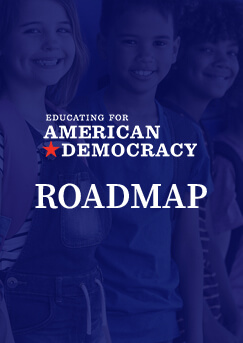Educating for American Democracy Principal Investigators Call for U.S. Department of Education to Reconsider its Proposed Priorities for American History and Civic Education
The proposed priorities are too narrow in focusing only on systemic inequities, and discriminatory policy and practice in American history — and should include focus also on stories of innovations, solution, and overcoming of that history and on teaching students how to engage in difficult conversations, according to the EAD Principal Investigators.
WASHINGTON DC [May 12, 2021] — The Principal Investigators of the Educating for American Democracy initiative has issued a public comment about the Proposed Priorities for American History and Civics Education that the U.S. Department of Education submitted to the Federal Register on April 19, 2021 — and called for a reconsideration by DOE of their proposal.
Educating for American Democracy (EAD) is a collaborative effort of more than 300 scholars and practitioners from across diverse viewpoints to change the way American history and civics are taught. Led by iCivics, Harvard University, Tufts University, CIRCLE, and Arizona State University, the initiative, launched in 2019, is funded by the National Endowment for the Humanities and the U.S. Department of Education. In March, EAD released the Educating for American Democracy Roadmap, which presents guidance that states and local school districts can use to implement rigorous and inclusive education in civics and history that prepares all learners for informed and engaged citizenship.
The proposed Priorities for American History and Civics Education, however, present a challenge and should be modified, according to EAD’s public comment. The first proposed priority, which seeks to support the development of culturally responsive teaching and learning, provides “a limited view of what is necessary to achieve that,” according to the comment from EAD’s principal investigators.
One challenge is that the projects proposed by DOE in their priorities’ must incorporate teaching and learning practices that “(a) Take into account systemic marginalization, biases, inequities, and discriminatory policy and practice in American history” and “(b) Incorporate racially, ethnically, culturally, and linguistically diverse perspectives and perspectives on the experience of individuals with disabilities.”
While documenting and learning from entrenched patterns of marginalization, enduring biases, inequities, and discriminatory policy and practice in American history is indeed an appropriate part of civic learning, “it is an incomplete foundation for civic learning,” according to the EAD public comment. EAD recommends refining the proposed priorities so that they reflect not just the failings in America’s history, but also how this country overcame and can overcome these failings, how individuals who have experienced oppression have acted as agents to achieve innovations to overcome problems of injustice, and how civic education can foster conversations about ways to move forward productively.
“We can deliver full and accurate histories that can empower all learners as civic agents standing on an equal footing with one another. This requires, however, not only bringing the wrongs to the surface, but also bringing forward the positive visions of democratic possibility and constitutional self-government that all the peoples of this country have developed over time,” EAD’s Principal Investigators wrote in their public comment.
Further, EAD’s Principal Investigators suggest that the Department of Education add another stated priority: “Namely that projects incorporate teaching and learning practices that develop students’ abilities to engage in and lead conversations about difficult, important topics across political differences.”
Failure to amend the priorities could threaten the progress that initiatives such as EAD have made, according to the public comment.
The 300 people who created the EAD Roadmap “shared a common commitment to the need to reinvest in civic education and social studies and a belief that achieving such investment requires breaking through polarization in our national conversations around civic education and social studies,” the three-page statement says. “Unfortunately, the proposed priorities, as articulated, along with the response they have provoked, lead us in the opposite direction. We urge a reconsideration that retains the goals of educating all students in ways that respond to their diversity and of helping us all to address the country’s hard histories, including the histories of enslavement and racism, while also prioritizing ambitious and rigorous learning in the service of civic strength, common purpose, and reflective patriotism.”
For more information about EAD, visit educatingforamericandemocracy.org. Media inquiries can be directed to jacob@oneallen.com



